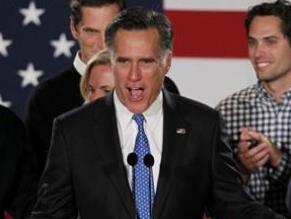|
World Jewish News

Republican presidential hopeful Mitt Romney (C) waves to his supporters during his caucus night rally following republican caucuses in Des Moines, Iowa, on January 3, 2012.AFP
|
Romney wins Iowa caucuses after tight race with Santorum
04.01.2012, Jews and Society Former Massachusetts governor Mitt Romney pulled out an early-morning victory over social conservative Rick Santorum by just eight votes, in the closest finish in Iowa caucuses history.
With all precincts reporting, Romney ended with 30,015 votes, eight more than Santorum, in the first contest in the Republican Party's process to nominate a challenger to President Barack Obama for the November presidential elections.
Iowa is better known for narrowing the field than picking a future president, and at least one candidate, Texas Governor Rick Perry, indicated his presidential bid may be over.
"I've decided to return to Texas, assess the results of tonight's caucus, determine whether there is a path forward for myself in this race," Texas Governor Rick Perry said after a disappointing fifth place finish.
With deep reserves of cash and a strong campaign infrastructure, Romney, a former Massachusetts governor, will emerge from Iowa in a much stronger position than his rivals even though he faces continued mistrust from conservatives.
A favorite of the party's business wing, Romney holds a commanding lead in the next nominating contest in New Hampshire in one week and has the resources to compete in bigger states like Florida at the end of the month.
Santorum vaulted from the back of the pack to emerge as the latest conservative favorite in a race that has been marked by volatility. Campaigning in all Iowa's 99 counties, he emphasized his seven home-schooled children and opposition to gay marriage in a bid to win the state's large bloc of Christian conservatives.
"Game on!" the former Pennsylvania senator told supporters.
Santorum staked his campaign on a strong showing in Iowa but with little cash and a bare-bones campaign operation, he could have difficulty competing in other states.
As an afterthought in the race until now, Santorum also had avoided the scrutiny that has derailed other candidates. Pennsylvania voters threw him out of the Senate by an 18-point margin in 2006, and rivals have begun to comb through his legislative record to paint him as a free-spending budget-buster.
Conventional wisdom holds that there are three tickets out of the state, though John McCain was able to overcome a fourth-place finish in 2008 to win the Republican nomination.
Ron Paul's unorthodox views, including supporting a return to the gold standard and an end to a U.S. overseas military presence, have won him a passionate following among voters who feel deeply alienated from more mainstream candidates. But he will have an uphill climb translating that into wider support.
Bud Hockenberg, a prominent Jewish Republican political activist from des Moines, told Haaretz it was "an exciting night," but added that he was "embarrassed and unhappy" about Ron Paul's success.
"People were talking in churches about his attitudes to Israel, evangelicals weren't happy about his positions on Iran and Israel," he said. "I am sure it cost him Iowa, and it will harm him in other states." He said this time there were about 125 thousand people voting (in 2008, there were about 119,000), and that it was a "disappointment."
The National Jewish Democratic Council expressed dismay over the results of the Iowa caucuses, saying that, "Tonight's results out of Iowa only serve to showcase the dramatic gap separating the top tier of the Republican presidential field from the vast majority of American Jews."
Democratic National Committee Chair Debbie Wasserman Schultz said that the Republican caucuses made it clear that they want "a candidate that supports Tea Party policies and lets Wall Street write its own rules."
Most of the candidates have topped opinion polls at one point in a race and many voters said they were undecided even as the caucuses got under way.
Voters gathered in schools, churches and other venues around on a cold evening in the midwestern state, listening to supporters tout the various candidates before casting their ballots. Democrats and independents were allowed to participate as long as they re-registered as Republicans at the site.
Outside groups associated with candidates, known as "Super PACs," have taken advantage of loosened campaign-finance rules to flood the Iowa airwaves with negative advertising.
Former House of Representatives Speaker Newt Gingrich saw seen his support erode under a barrage of such attack advertisements, many from a Super PAC run by Romney allies. He looked likely to finish in fourth place.
Sparsely populated Iowa only yields 28 delegates of the 1,143 needed to lock up the Republican presidential nomination, and those delegates aren't actually awarded for months after Tuesday's caucuses.
By Natasha Mozgovaya and Reuters
Haaretz.com
|
|
